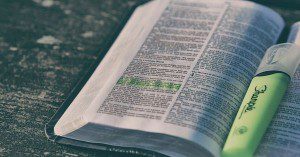 The expression “post-haste” was something I once heard from a teacher and it followed a request to go to some office to get something. “And do it post-haste.” I thought about the meaning of that expression then about as often as I did about any expression — not at all. But, that expression has a history:
The expression “post-haste” was something I once heard from a teacher and it followed a request to go to some office to get something. “And do it post-haste.” I thought about the meaning of that expression then about as often as I did about any expression — not at all. But, that expression has a history:
On the envelope of a letter a writer would write “haste, post, haste” to signal to the post carrier that he or she wanted this letter to get to its destination soon and very soon.
The psalmist, in 119:58-60, declares to God that he is intent on imploring God from the depth of his heart (v. 58), he is resolute in his commitment to do God’s decrees, and he has “hurried and not delayed” to keep God’s commandments — posthaste, we might say, he has committed to do what God says.
My favorite commentary on all things Psalms? John Goldingay, Psalm 101-150
The psalmist captures our hurrying about with a word: Are we “hurrying” (posthaste) to do God’s will? When confronted with two options, are we in a hurry to do what God wants or in a hurry to do what we want?
Erik Weisz was the great Houdini — no matter how they tied him up, he could escape. He had, of course, all kinds of secrets to his clever ways, but always he managed to get out of the bonds. The psalmist, too, is bound:
“Though the bonds of the wicked are coiled around me, I have not neglected your teaching” (119:61).
I wonder if it is not the next verse, though, that shows how the psalmist “escaped” from the ropes and bonds of his enemies:
“At midnight I rise to give you thanks for your righteous laws.” (119:62)
Was his daily habit of rising at midnight — I’m suggesting that it was a daily habit –Â what we now call the “office of readings” and “night prayer” or even “compline” — that gave him the joy and the confidence to escape? At midnight, he says, he arose to give thanks to God or to praise God. He arises at midnight — in the middle of the night — to give praise to God. “Thanksgiving,” Charles Spurgeon once said, “turns night into day.”
A theme verse for the Evangelical Covenant Church, the sponsor of North Park University, where I used to teach, is Psalm 119:63:
I am a companion to all who fear you, to all who follow your precepts.
The psalmist had friends; his friends were those who feared God and who followed God’s ways. To be a “companion” or a “friend” (Hebrew chaber) is to be joined to another, to be clasped to them — the way the wings touched one another in Ezekiel’s visions, the way curtains were clasped to one another in the tabernacle, the way tribes made a league with one another.
By the time of the NT the followers of Jesus had become “companion” with one another in the journey and the early church folks had learned to be friends especially with those in the household of faith. There is no hint here of separatism, but there is a strong smell of fellowship — and the psalmist’s fellowship was focused on anyone who feared God and whose fear of God was shaped by following Torah.
I love these words: “The earth is filled with your love, LORD;
teach me your decrees” (119:64).
24:1: “The earth is the LORD’s, and everything in it,
the world, and all who live in it.”
33:5: “The LORD loves righteousness and justice;
the earth is full of his unfailing love.”
104:24: “How many are your works, LORD!
In wisdom you made them all;
the earth is full of your creatures.”
The psalmist knows God’s gracious love is spread out over the world because God made it, because God’s world witnesses to his justice, and because it is filled with God’s wisdom. I think the decrees of which he speaks in 119:64b reflect that love and he sees God’s love in the universal acclamation of God’s decrees. No matter where the psalmist goes — and he’s been chased all over the Land — he finds God’s mercy everywhere he goes. In fact, the world is full of it — the way vessels are full to overflowing, the ocean filled with swimming creatures, a house with smoke, and the life filled with God’s Spirit.
The whole earth, he says, is filled with God’s merciful love.












